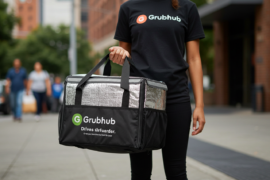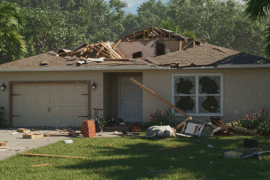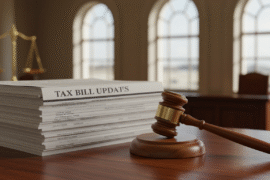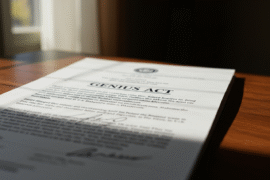This article may contain references to products or services from one or more of our advertisers or partners. We may receive compensation when you click on links to those products or services. Nonetheless, our opinions are our own.
The information presented in this article is accurate to the best of our knowledge at the time of publication. However, information is subject to change, and no guarantees are made about the continued accuracy or completeness of this content after its publication date.
FHA Loan Closing Costs Explained (With Example)
When using an FHA loan to buy a home, there are other factors to take into account. Borrowers also pay FHA loan closing costs, which are the collection of fees due at signing. On average, these costs typically range from 2% to 5% of the loan amount, excluding the down payment. This guide explains the components of FHA closing costs, provides a calculator-style example, and suggests ways to budget for and cut down on upfront costs.
What Are FHA Closing Costs?
Closing costs are the fees required to finalize an FHA mortgage and transfer ownership. These pay for services from lenders, appraisers, title companies, insurers, and local governments. Typical line items include lender and third-party fees along with prepaid items collected at closing. Understanding which charges are discretionary versus required helps you plan, compare offers, and avoid surprises.
Common Items You May See
- Origination fee: The lender’s charge for processing and underwriting the loan.
- Appraisal fee: An FHA-required appraisal from an approved professional to confirm value and condition.
- Credit report fee: The cost to pull and review your credit history.
- Title search & title insurance: Verifies clear ownership and protects against title defects.
- Prepaid interest: Covers the daily interest owed between closing and the start of your monthly payments.
- Property taxes & escrow setup: Initial deposits for taxes and insurance held by your servicer.
- Homeowners insurance: Usually one year of coverage paid at closing.
While amounts vary by lender, loan type, home price, and location, the overall 2%–5% range is a practical planning estimate for many buyers. Ask each lender for a standardized Loan Estimate to compare these costs across offers.
FHA loans require mortgage insurance that comes in two parts: an upfront premium and an annual premium added to monthly payments. The Upfront Mortgage Insurance Premium (UFMIP) is set at 1.75% of the base loan amount for most FHA purchase and refinance loans. Lenders must remit the upfront MIP shortly after closing, and most borrowers choose to finance it by rolling it into the loan. The annual MIP is paid monthly and depends on factors like loan term and loan-to-value.
Voted "Best Overall Budgeting App" by Forbes and WSJ
Monarch Money helps you budget, track spending, set goals, and plan your financial future—all in one app.
Get 50% OFF your first year with code MONARCHVIP
Sample FHA Closing Costs Breakdown
The following scenario illustrates how FHA closing costs can add up and how the UFMIP affects your cash flow. Use it as a framework to plug in your numbers when you receive a Loan Estimate.
Scenario Inputs
- Home price: $250,000
- Down payment (3.5%): $8,750
- Base loan amount: $241,250
Estimated Closing Costs (3% of the loan amount)
$241,250 × 0.03 = $7,237.50
| Closing cost item | Estimated cost |
|---|---|
| Origination fee | $1,200 |
| Appraisal fee | $450 |
| Credit report fee | $75 |
| Title searches & insurance | $1,000 |
| Prepaid interest | $600 |
| Property taxes | $1,200 |
| Homeowners insurance | $1,800 |
| Upfront FHA MIP (1.75%) | $4,221 |
| Total | $11,458.50 |
Without the UFMIP, these illustrative closing costs are roughly $7,200; adding the 1.75% UFMIP brings the total near $11,500. This example shows why it’s helpful to view closing costs in two buckets: core fees and FHA insurance. After you apply, your lender must send a Loan Estimate within three business days so you can see your personalized figures and compare.
Ways To Reduce or Cover FHA Closing Costs
FHA rules and market practices provide several avenues to lower your upfront cash. Each option has trade-offs that affect your interest rate, monthly payment, or negotiation strategy with the seller. Consider blending methods based on your budget, competition for the home, and time horizon. Always confirm specifics on your Loan Estimate and final Closing Disclosure.
Practical Options
- Seller concessions: FHA permits interested parties (e.g., sellers) to contribute up to 6% of the sales price toward buyer costs and discount points, subject to rules.
- Lender credits: Some lenders offset part of your costs in exchange for a slightly higher rate; compare the lifetime cost before accepting.
- Gift funds: FHA allows eligible gift money from family to cover down payment and closing costs when properly documented.
- Finance the UFMIP: Most borrowers roll the 1.75% upfront MIP into the loan instead of paying it in cash at closing.
Your Required Disclosures and Timeline
After you apply, the lender must provide a Loan Estimate within three business days so you can review rate, payment, and closing cost details. Before closing, you must receive a Closing Disclosure at least three business days in advance; use this window to confirm that terms match your expectations. These timing rules help you budget accurately and flag discrepancies early. If you haven’t received the Closing Disclosure on time, please reach out to your lender promptly.
FAQs
How much are FHA loan closing costs?
They commonly total about 2%–5% of the loan amount, plus the 1.75% upfront MIP. Exact costs can differ based on the lender, property, and location, so please refer to your Loan Estimate for a detailed breakdown.
Can FHA closing costs be rolled into the loan?
You can finance the upfront MIP by adding it to your loan amount. Most other third-party fees must be paid at closing unless covered by seller concessions or lender credits.
Who pays FHA closing costs?
The buyer typically pays, but sellers may contribute up to 6% toward allowable costs and points, and lenders can offer credits tied to rate. Please review your purchase contract and Loan Estimate for detailed information.
Are FHA closing costs negotiable?
Many lender-controlled fees (such as origination) are negotiable, and you can shop multiple lenders to compare quotes. Third-party fees can vary by provider, so ask for alternatives where permitted.
What’s the difference between an FHA down payment and closing costs?
The down payment is your equity contribution toward the price (minimum 3.5% for many FHA borrowers), while closing costs are service fees and insurance premiums needed to finalize the loan.
When are FHA closing costs due?
They are due at the closing appointment along with your down payment. You should receive a Closing Disclosure at least three business days prior that lists the exact cash to close.
Conclusion
Buying a home with an FHA loan can be an accessible path to ownership when you plan for both the down payment and the closing costs. Understanding core fees, FHA mortgage insurance, and available offsets such as seller concessions and lender credits helps you manage your cash-to-close. Use the required Loan Estimate and Closing Disclosure timelines to compare offers and verify numbers before you sign. With accurate budgeting and documents in hand, you can approach the closing table confidently and avoid last-minute surprises.

Reviewed and edited by Albert Fang.
See a typo or want to suggest an edit/revision to the content? Use the contact us form to provide feedback.
At FangWallet, we value editorial integrity and open collaboration in curating quality content for readers to enjoy. Much appreciated for the assist.
Did you like our article and find it insightful? We encourage sharing the article link with family and friends to benefit as well - better yet, sharing on social media. Thank you for the support! 🍉
Article Title: FHA Loan Closing Costs Explained 2025
https://fangwallet.com/2025/08/24/fha-loan-closing-costs-explained-2025/The FangWallet Promise
FangWallet is an editorially independent resource - founded on breaking down challenging financial concepts for anyone to understand since 2014. While we adhere to editorial integrity, note that this post may contain references to products from our partners.
The FangWallet promise is always to have your best interest in mind and be transparent and honest about the financial picture.
Become an Insider

Subscribe to get a free daily budget planner printable to help get your money on track!
Make passive money the right way. No spam.
Editorial Disclaimer: The editorial content on this page is not provided by any of the companies mentioned. The opinions expressed here are the author's alone.
The content of this website is for informational purposes only and does not represent investment advice, or an offer or solicitation to buy or sell any security, investment, or product. Investors are encouraged to do their own due diligence, and, if necessary, consult professional advising before making any investment decisions. Investing involves a high degree of risk, and financial losses may occur including the potential loss of principal.
Source Citation References:
+ Inspo
There are no additional citations or references to note for this article at this time.












































